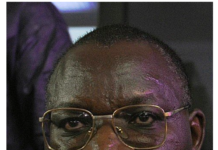By David Himbara

In October 2020, the young people of Nigeria decided they had enough of governmental arrogance, violence and bad governance. Hundreds of thousands of them across the vast country of 207 million people poured onto the streets to protest police violence. These young people would not leave the streets for two weeks until their demands were met. The government soon backed down and disbanded a notorious federal police force widely known for grand violence and criminality against the very people the force is meant to protect.
Perhaps, Africa is witnessing young people’s revolution against the power of the old men that rule the continent. Recall that in 2019, the young people of Sudan were largely responsible for toppling the 30-year regime of Omar al-Bashir. Like their Sudanese counterparts, the young people of Nigeria are demonstrating that misgovernce will no longer be tolerated.
Nigeria looms large in Africa and what happens in that country matters
The fact that the highly successful mobilization by young people took place in Nigeria is not surprising. Nigeria has a habit of leading the continent. Nigeria is Africa’s leader in several important respects. Begin with the sheer size of the country. Nigeria’s population of 207 million is 16 percent of Africa’s population of 1.3 billion people. With a GDP of $448 billion, Nigeria is the largest economy in Africa. Nigeria is also Africa’s leader in key and strategic continental institutions. For example, Nigeria is the largest shareholder of the African Development Bank (AfDB), Africa’s premier development agency with a reported capital of $208 billion in 2019. Nigeria’s stake in AfDB is 8.2 percent.
Nigeria’s diaspora overseas also leads their African counterparts. For example, Nigerians in the United States now constitute the single most accomplished community there, even head of native-born Americans. Besides being the largest African community in the U.S., Nigerians are found in leadership positions in business, universities, and healthcare sector, among others. Nigeria is second to Egypt in the amount of diaspora remittances sent back home at $26 billion and $23 billion, respectively. Last but not least, Nigerian cultural influence across the continent via its impressive entertainment industry of music and film is unequalled.
The importance of Nigerian youth uprising in the broader Africa context
Nigeria’s young people made Africa proud. When hundreds of thousands of Nigeria’s young people poured onto the streets, they had one purpose. They told the Muhammadu Buhari government that they would no longer tolerate state-sanctioned violence, police brutality and thieving. The massive nation-wide protest targeted in particular Nigeria’s hated Special Anti-Robbery Squad (SARS). The protesters told the rulers of Nigeria and Africa at large that young people have finally found their voices.
The Nigerian youth rightly claimed a victory and vowed to press on with more demands for human rights. The Buhari government was forced to disband SARS. The remarkable display of youth power against state-sanctioned violence resonates across the African continent for one particular reason. Young people who constitute the majority of the African population can no longer taken for granted.
The uprising showed that Africa is still led by old men
There is nothing new about the police robbing, attacking and even killing people in Nigeria and Africa. But the latest wave of protests led by the young people of Nigeria used new tools. Over a period of two weeks, an outpouring of support for Nigerian protesters against police brutality played out on Twitter, Facebook and other social platforms. Social media influencers who described themselves as ‘accidental leaders’ took up the cause and the rest is history.
This uprising in Nigeria fought on social media platforms shines a spotlight on how African leaders are out of touch with the led. The youth are in effect saying that Africa is young, yet its leaders are dinosaurs. In December 2020, Nigeria’s president Muhammadu Buhari will be 78 years old, which is the average age of the ten oldest African leaders. Put another way, the African leaders are disconnected by the age gap between them and the led. According to the UN data, 226 million youth aged 15-24 lived in Africa in 2015. This represented nearly 20% of Africa’s population, making up one fifth of the world’s youth population. If people aged below 35 are included, the number increases to a staggering three quarters of the African population. Yet, these young Africans are led by old men, some of whom are nearly 80 years old. The young people of Nigeria are saying on behalf of over 226 million African youth that it is time to be heard.

David Himbara, PhD, is an educator, author, and professor of international development based in Toronto, Canada. He previously headed strategy and policy for the president of Rwanda. Himbara has consulted extensively for governments including South African government and for organizations such the African Development Bank. Himbara taught political economy at universities in South Africa and the US.































































